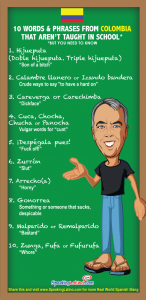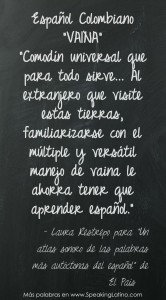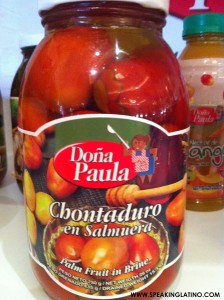The following words and phrases didn’t make it to our top 10 list here, but you will also hear them in Colombia and certainly not in a formal Spanish class.
The Most Versatile Word in Colombian Spanish: VAINA
Every country has a flag, food and symbols that identify them. But what about a single word? During the 6th International Congress of the Spanish Language (VI Congreso Internacional de la Lengua Española) celebrated in Panama, the blog Papeles Perdidos, created by the newspaper El País, published an atlas of the representative words of Spanish-speaking […]
10 Vulgar Spanish Slang Words and Phrases from Colombia: Infographic
You rarely learn slang terms in class, especially not the extra dirty or harsh ones. Here are 10 Colombian dirty Spanish words and phrases that you won’t hear in any proper Spanish course. I think it’s obvious why your Spanish teacher omitted words like these from the lesson plans. Use them wisely, and sparingly, unless […]
CHONTADURO and SALMUERA: Colombia Spanish Words
This was an interesting word-find for me. I had never heard of chontaduro or salmuera until I ran across this jar of preserved fruit. Good think the jar itself offered translations. Problem is, I don’t know what a “palm fruit” is in English either. Hopefully I can taste one soon. As for salmuera, which means […]
6 Inverse Colombia Spanish Slang Words
One of the particularities you can get in the slang of a country is the phenomenon of creating new words by inverting or changing the order of the original. These new inverted words keep the same meaning as the original one. Argentina was the first country where Jared identified 24 inverted words and dedicated a […]
palanca
In Spanish slang, 'palanca' generally refers to influence or connections someone has that can be used to gain an advantage. It's mostly used when referring to personal relationships that are used to obtain favors or benefits. Examples Spanish: Conseguí este trabajo gracias a la palanca de mi tío que es amigo del jefe. English: I […]
pimentón
In the context of Spanish slang, 'pimentón' is not a slang term. It is a standard Spanish word for 'paprika', a type of spice. However, depending on the region, it can be used to refer to a red bell pepper. Examples Spanish: Voy a agregar un poco de pimentón a la paella para darle color […]
narizona
A colloquial term used in some Spanish-speaking regions to describe someone with a large nose. It comes from the combination of the words 'nariz' (nose) and '-ona' (a suffix indicating largeness). Examples Spanish: ¡No te burles de Juan, él se siente mal por ser narizona! English: Don't make fun of Juan, he feels bad for […]
matapasiones
A term used to describe an item of clothing, usually large or unflattering, that is considered to diminish a person's physical attractiveness. It literally translates to 'passion killer'. Examples Spanish: No puedo creer que te hayas puesto ese matapasiones para tu cita. English: I can't believe you put on that passion killer for your date.
atrapalocas
Atrapalocas is a colloquial term used predominantly in Spain to refer to someone who is clumsy or tends to mess things up. It can also refer to a person who often gets confused. Examples Spanish: No dejes a Juan arreglar el coche, es un atrapalocas y puede causar más daño. English: Don't let Juan fix […]
brasilera
A colloquial term in Spanish that refers to a woman from Brazil. Examples Spanish: La brasilera que vive en mi edificio es muy amigable. English: The Brazilian woman who lives in my building is very friendly.
calzones
In slang context, 'calzones' refers to female underwear or undergarments. In literal terms, it refers to a type of Italian stuffed pizza. Examples Spanish: ¡Olvidé empacar mis calzones para el viaje! English: I forgot to pack my underwear for the trip!
pan de trigo
Literally translates to 'wheat bread'. However, this is not a slang term in Spanish. It is used to refer to the actual bread made from wheat. Examples Spanish: Para el desayuno, prefiero el pan de trigo en lugar de pan blanco. English: For breakfast, I prefer wheat bread instead of white bread.
basurero
In Spanish slang, 'basurero' typically refers to a garbage can or a dumpster. It can also be used metaphorically to describe a place or situation that is messy or chaotic. Examples Spanish: Por favor, tira la basura en el basurero. English: Please, throw the trash in the dumpster.
escamoso
A Colombian slang term used to describe someone who is sneaky, sly or tricky. Examples Spanish: No confíes en él, es muy escamoso. English: Don't trust him, he is very sneaky.
pinchado
A colloquial term primarily used in Latin America, 'pinchado' refers to someone who is infatuated or deeply in love. It can also mean someone who is obsessed with something. Examples Spanish: Juan está pinchado con Maria, no para de hablar de ella. English: Juan is infatuated with Maria, he can't stop talking about her.
cosedora
In Spanish slang, 'cosedora' usually refers to a sewing machine. However, in some contexts, it can also be used to describe a person who sews a lot or whose profession is sewing. Examples Spanish: Mi abuela es una cosedora excelente, siempre está arreglando nuestra ropa. English: My grandmother is an excellent seamstress, she is always […]
tugurios
A derogatory term used to refer to run-down, poor or undesirable places, often associated with areas of poverty or neglect. Examples Spanish: No me gusta visitar esos tugurios, siempre me siento inseguro. English: I don't like visiting those slums, I always feel unsafe.
trespuntadas
The term 'trespuntadas' is a Mexican slang term used to refer to something that is done quickly and without much care or attention to detail. Examples Spanish: Hice la tarea a trespuntadas porque no tenía mucho tiempo. English: I did the homework in a rush because I didn't have much time.
chanclas, chanclitas
A Spanish slang term (Puerto Rican) usually referring to flip-flops or casual sandals. It can also be used metaphorically to refer to discipline, as it's common in Hispanic culture to jokingly threaten to throw a 'chancla' as a form of punishment. Examples Spanish: No olvides tus chanclas para la playa. / Mi mamá me amenazó […]
maíz pira
A Venezuelan slang term referring to popcorn. It is used to describe when a situation is getting interesting or dramatic, similar to the English saying 'grab your popcorn'. Examples Spanish: Prepara el maíz pira, esto se va a poner bueno. English: Prepare the popcorn, this is going to get good.
esfero
Esfero is a colloquial term used in Colombia for a pen. It comes from 'esferográfico', which is a type of pen. Examples Spanish: Por favor, pásame ese esfero, necesito tomar apuntes. English: Please, pass me that pen, I need to take notes.
lapicero
A colloquial term commonly used in Latin America to refer to a pen. Examples Spanish: Por favor, préstame tu lapicero para anotar esto. English: Please, lend me your pen to write this down.
gafas
A colloquial term for 'glasses' or 'spectacles'. Examples Spanish: Olvidé mis gafas en casa, ahora no puedo leer bien. English: I left my glasses at home, now I can't read properly.
garro
A Spanish slang primarily used in Spain, 'garro' is a colloquial term for cigarette. Examples Spanish: Voy a salir a la calle a fumar un garro. English: I'm going to go out on the street to smoke a cigarette.
tabaco
In Spanish slang, 'tabaco' is commonly used to refer a cigarette. It can also refer to any type of tobacco product. Examples Spanish: ¿Tienes tabaco? Me apetece fumar. English: Do you have a cigarette? I feel like smoking.
buseta
A colloquial term used in some Latin American countries, specifically Colombia and Ecuador, to refer to a small bus or minibus. Examples Spanish: Vamos a coger la buseta para ir al centro. English: We are going to take the minibus to go downtown.
falso
A slang term used to describe something or someone that is not genuine, fake, or dishonest. Examples Spanish: No puedes confiar en él, es muy falso. English: You can't trust him, he's very fake.
buceta
In Spanish, particularly in Spain, 'buceta' is not a slang term. However, it is a vulgar slang term in Portuguese, used to refer to the female genitalia. The use of this term is considered offensive and disrespectful. Examples Spanish: No es apropiado utilizar la palabra 'buceta' en una conversación formal. English: It is not appropriate […]
cacorro
Slang term used in Colombia, especially in the Bogota area, to refer to a young man or boy. It can be used affectionally or pejoratively, depending on the context. Examples Spanish: Ese cacorro es mi hermano menor. English: That young man is my younger brother.



